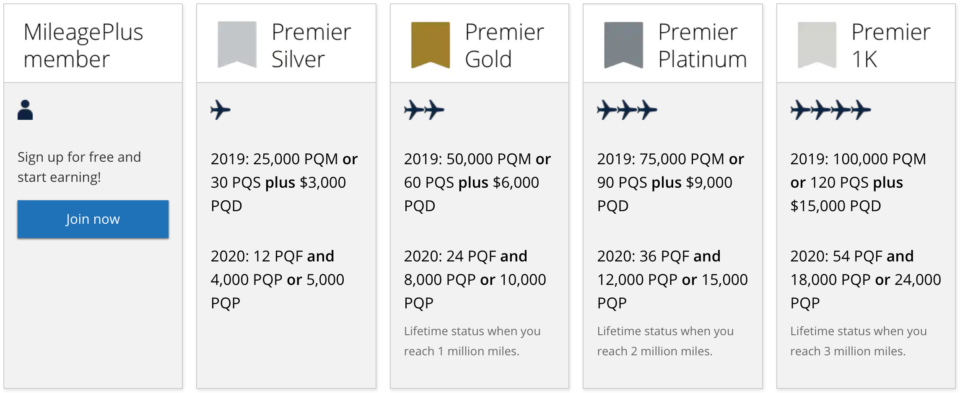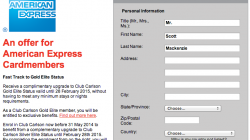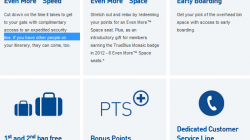For a long time, there have been two types of miles to keep track of in any frequent flyer program: RDM and EQM. RDM are redeemable miles that can be exchanged for upgrades or a free flight award (and an increasingly large number of other awards like hotel nights or laptop computers). EQM are elite qualifying miles that track your progress toward elite status. The exact names that airlines use for these terms will vary (e.g., United likes to call theirs “Premier Qualifying Miles” instead of “elite qualifying miles”), but the basic principal is consistent across programs.
Now United Airlines is ditching the EQM concept when it comes time to calculate your status with MileagePlus.
Why Do Elite Qualifying Miles Exist?
RDM and EQM have separate tallies because airlines tend to be stingier about who gets that shiny loyalty card. You might earn a lot of redeemable miles through a co-branded credit card, but elite qualifying miles are often limited to taking an actual flight. Some airlines also track the number of flights, in case you are the type of person who travels often but very short distances.
It’s very easy for passengers to track how far they are traveling. It makes intuitive sense that traveling further involves more time on a plane, delivers more revenue to the airline, and should be rewarded commensurately. Ticket prices may vary, but the airline has already assumed a mix of different fares to ensure the entire plane goes out full.
Unfortunately, most airlines weren’t satisfied with that arrangement and have been more closely tracking which customers actually pay more for their flights even when they travel the same distance as others. We have seen more and more carriers adopt EQD, or elite qualifying dollars, that require both a certain minimum spend in addition to a certain minimum distance flown.
How Is United Changing MileagePlus?
United Airlines has now reinvented the logic of earning status, ditching the concept of Premier Qualifying Miles entirely. It’s important to note that the changes announced today will not affect how you earn redeemable miles. These changes are only for earning status.
In the past, you had to meet two criteria for status: (1) earn a certain number of Premier Qualifying Miles or Premier Qualifying Segments and (2) earn a certain number of Premier Qualifying Dollars or receive a waiver.
The new program will only track the amount you spend or the number of segments, but not the distance you fly. The term “Premier Qualifying Dollars” is being replaced with a new name, Premier Qualifying Points. These PQP are calculated exactly the same: $1 spent on airfare = 1 PQP. There will no longer be any waiver for PQD (now PQP). Premier Qualifying Segments are also getting a new name; these will now be Premier Qualifying Flights, or PQF.
International partners are also going to be affected by this change, but they will have their own rules. If you travel on a partner airline such as Lufthansa or Singapore Airlines, you’ll earn PQP only, not PQF. The number of PQP will not be determined by how much you spent. It will be calculated based on how far you fly, and then United will divide that by either 5 or 6 to determine how many PQP you earn.
For example, If United has a cozy relationship with the operating carrier, flying 6,000 miles will get you 1,200 PQP. If the relationship is less good you’ll earn just 1,000 PQP. It doesn’t matter whether you spend $500 or $5,000 on that ticket. You’ll earn the same number of PQP either way.
New Criteria for Earning Status in 2020
United MileagePlus will use these PQP and PQF to determine your elite status for 2021 based on your travel during 2020. It’s making the announcement now so that you have some time to anticipate the changes before you start taking eligible flights in 2020.
2020 Elite Status Requirements
- Premier Silver: either (1) 12 PQF and 4,000 PQP or (2) 5,000 PQP
- Premier Gold: either (1) 24 PQF and 8,000 PQP or (2) 10,000 PQP
- Premier Platinum: either (1) 36 PQF and 12,000 PQP or (2) 15,000 PQP
- Premier 1K: either (1) 54 PQF and 18,000 PQP or (2) 24,000 PQP
If we were to imagine no changes to the current qualification criteria, you might expect that the number of PQP will be the same as the number of PQD under the old system. After all, they are both calculated the same way. WRONG!
The number of PQP you need is going up by at least 30% in most cases. For example, you’ll need 5,000 PQP to earn Premier Silver status during 2020, while the 2019 rules required only 3,000 PQD. You can knock that down to 4,000 PQP if you have at least 12 PQF, which sounds reasonable but isn’t exactly fair to the person taking international flights. You could easily hit 4,000 PQP with a single international business class ticket and get just 2 PQF.
Finally, you still need to have at least four flights on United Airlines during the entire year. That rule existed in the old program and will still exist in the future.
Big Spenders Win, but Everyone Else…
First, I have to give United credit for doing something original. So much of its loyalty program strategy in recent years has just been copying Delta. This is new. It’s also a logical extension of past changes. I wouldn’t be surprised to see Delta copy United and also focus on spend instead of distance flown.
The new program rules will naturally favor the biggest spenders. Ordinary people who try to spend the least possible on their tickets will find it increasingly difficult to earn enough PQP to reach status. I suppose those who travel often on short flights will get a break as they rack up PQF, but these short flights tend to be expensive on a price-per-mile basis. It’s not likely to be a cheaper path to status overall.
United’s most lucrative customers are the only ones coming out ahead. You can imagine there were some people who spent a lot but didn’t fly very far. Under the old program they might have found themselves in a unique position where they had plenty of PQD but not enough PQM. They would need to fly just for the heck of it to earn their status. Now they can qualify on PQP alone. In addition there are likely to be fewer people qualifying for status, so those benefits will be shared among a smaller pool. Upgrades, for example, might become easier to obtain.
At the end of the day this isn’t the kind of program I’d want to participate in, but I’m also not the kind of customer United wants to pursue. The shift to focusing on revenue at the expense of all else is …depressing. It doesn’t feel like loyalty to me. It feels like ranking every customer by their value to the company, and dumping the ones who don’t measure up.






